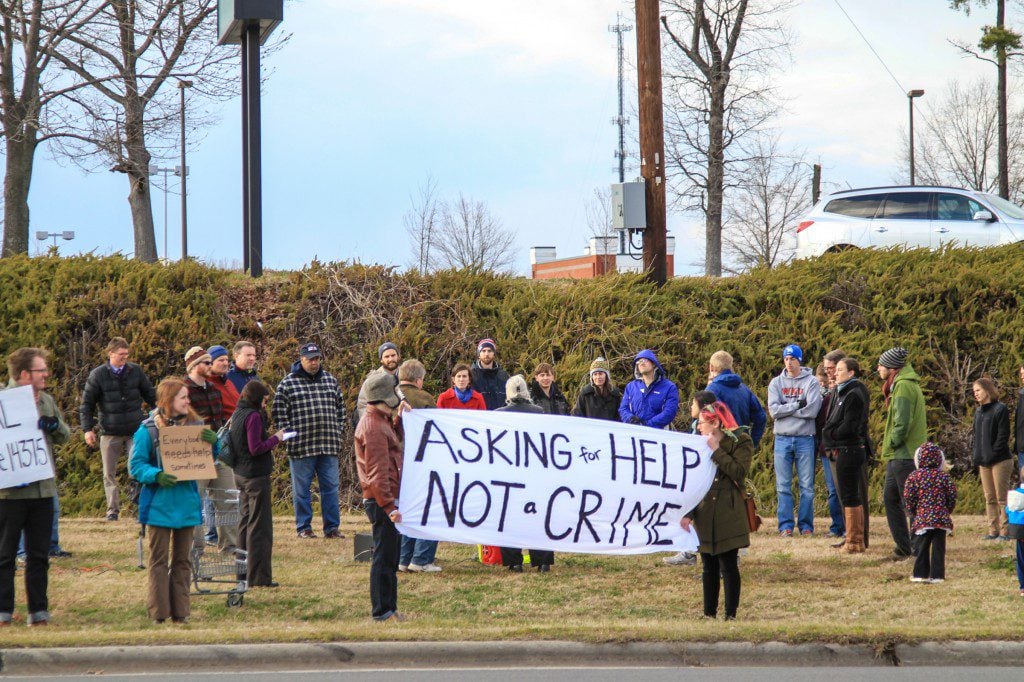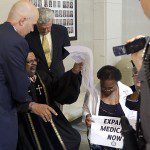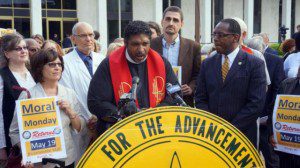 Back in the winter, I got a call one morning from a friend who works on the streets in Durham, connecting with homeless folks and exploring ways they might become part of church communities here in town. She was facing a crisis. Her friends were getting tickets under a new anti-begging ordiance in Durham and they didn’t know what to do. I called a lawyer friend, met with folks who’d gotten tickets, and gathered some other friends for an organizing meeting. A few weeks later, a couple hundred of us gathered for a public meeting at a local church. The next day, members of our City Council asked to meet. We worked through the spring and summer and came up with an alternative ordinance that everyone could support–even the local businessman who’d initially opposed us. (Council still needs to pass our revision for it to become law, so please pray for that to happen soon. We’re hoping to have a big celebration October 29th with everyone who helped make this win possible.)
Back in the winter, I got a call one morning from a friend who works on the streets in Durham, connecting with homeless folks and exploring ways they might become part of church communities here in town. She was facing a crisis. Her friends were getting tickets under a new anti-begging ordiance in Durham and they didn’t know what to do. I called a lawyer friend, met with folks who’d gotten tickets, and gathered some other friends for an organizing meeting. A few weeks later, a couple hundred of us gathered for a public meeting at a local church. The next day, members of our City Council asked to meet. We worked through the spring and summer and came up with an alternative ordinance that everyone could support–even the local businessman who’d initially opposed us. (Council still needs to pass our revision for it to become law, so please pray for that to happen soon. We’re hoping to have a big celebration October 29th with everyone who helped make this win possible.)
Late this spring, I got an email from my friend William Barber who heads out state’s NAACP. After petitioning our General Assembly about sweeping changes in our government that would directly affect people in neighborhoods like ours, Rev. Barber decided to engage in civil disobedience to highlight the fact that public officials didn’t simply disagree with him on policy; they were refusing to listen to poor citizens who had legitimate concerns.
Rev. Barber invited me to join him, so I went over to Raleigh. I wrote an open letter to our state’s budget director, trying to articulate why concern for the poor is in fact concern for us all. I joined those petitioning our legislators and had to explain to my kids why their dad was carried off in handcuffs. By mid-summer, Moral Mondays had become a national news story. I was getting updates on Rev. Barber via TIME Magazine and the New York Times. But who could have known that back in May? These things always start with a call from a friend, and email from a mentor.
Which is why, just week before last, when I got a call from another friend in Old East Durham saying the police had just shot and killed someone in front of her house, I got on the phone again–listening to get the facts, making sure testimonies were documented, calling in pastoral and mental health services, writing our police chief to urge him to handle this case carefully. And, when the chief chose to defend his man publicly before his department’s investigation was completed, I went with my pastor to stand with neighbors who have legitimate concerns about how our communities are being policed.
I didn’t know when I went what would become of our efforts. In this case, I still don’t. But my work, I’m learning, is to respond to the call as faithfully as I can–to ask over and again where God is bringing together beloved community for the common good and how we can best serve it.
The Rutba House community has been making plans to build a new house in the neighborhood. As part of that process, I’ve been talking to banks. They always want to know, “Who do you work for?”
The easy answer is School for Conversion. But the question has led me to meditate on SFC’s vision statement, which begins, “School for Conversion works for beloved communities that unlearn habits of social division….” Who do I work for? Ultimately, it’s these beloved communities, made up of friends who love Jesus and love justice and call when they need some help to shine the light on what is wrong in our world so we might find a way forward together.











